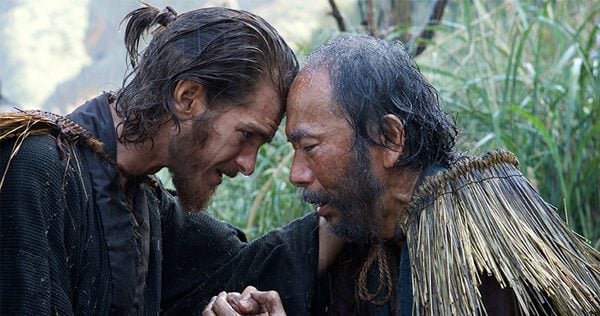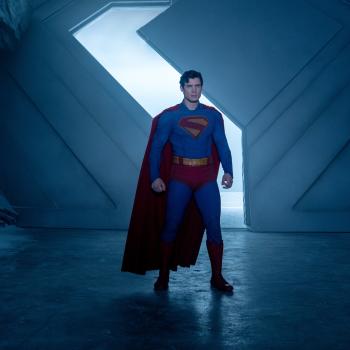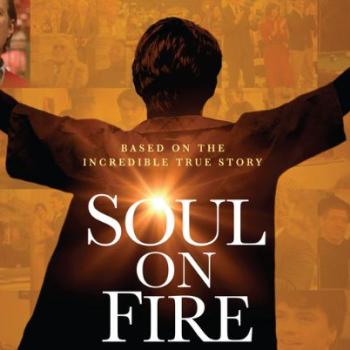Silence, the latest film from esteemed director Martin Scorsese, is a labor of love 26 years in the making. Based on the 1966 novel by Shūsaku Endō, the story centers on two Jesuit priests Fathers Sebastião Rodrigues and Francisco Garupe (played by Andrew Garfield and Adam Driver) searching for their missing mentor Father Ferriera (Liam Neeson) in 17th-century Nagasaki, Japan.

The film, which has charmed film critics, is beautifully shot, emotionally gripping and theologically thought-provoking, centering on themes such as persecution, cultural conflict, belief, and doubt, as the title suggests. It serves more as a catalyst for critical conversation rather than popcorn entertainment. For me, it has lingered in my mind for many days since seeing it.
Kutter Calloway, assistant professor of Theology and Culture at Fuller Theological Seminary’s School of Theology, has become somewhat of an unofficial ambassador for the film, which has not been fully embraced by the Christian filmgoing community. Calloway, who facilitated a discussion at Fuller with Scorsese, recently spoke to Reel Faith about how audiences have processed the film and the issues the film has faced in broadening its reach. Reel Faith editor DeWayne Hamby was also joined by Rob Alderman, host of the 5Dollar Film podcast, for the interview (to hear the full podcast in full, visit 5Dollar Film).
DeWayne: I just saw the film and was quite impacted by it. Can you talk about your relationship as somewhat of a film ambassador for it?
Kutter Calloway: The relationship is really a new one. I don’t want to overstate my relationship with the film. Obviously, the novel itself is meaningful to me and I was excited to see Scorsese bring this to the screen. A lot of what we do at Fuller and what I do teaching at Fuller in theology and film really involves building relationships with filmmakers, with studios and we often will bring in pretty big films and somebody from the production to be involved. It happens that Martin Scorsese is kind of the patron saint of filmmaking, so he is one of the hardest fish to catch but it’s a great honor for him to come and join us for our screening. So we got to interview him, I got to give him a tour of our campus and chat with him about not just this film, Silence, but also really interestingly, he was really open and articulate about filmmaking in general, sort of really his Christian vocation to be a filmmaker. Just just a fascinating conversation from a wise man who’s been an artist and cultural creator for his whole life.

assistant professor of Theology and Culture, Fuller Theological Seminary School of Theology
Rob: You were talking about having a special relationship with the book. How did you feel that translated to the film?
If there’s a failure in the film, I think it’s a failure of the novel, in terms of the viewer. If someone’s going to be disappointed in something. I say that because I actually think it’s one of the more faithful adaptations of a novel that I can really remember. Lord of the Rings is probably one of the others, but even there, those novels are so dense and have so much in them, I think he did a fantastic job of adapting it to the screen.
DeWayne: What do you see that’s different about Silence than other faith films? There are very explicit faith elements in it but somehow it hasn’t been championed as a Christian film in the mainstream.
Kutter Calloway: I think at the core, we—the Christian filmgoing community in the United States—are a confused and confusing bunch. We clamor and wherever that happens sort of has a block, for certain kinds of films yet when Hollywood turns around and produces what I think is exactly what we want, we don’t go see it. But we will go see other films that, for one reason or another, that we rally around. To be honest, I can’t understand it. I can guess why that is or what’s going on.
A lot of it has to do with trusting the author. Who is it that’s telling this story to us and do I trust that person? Then generally I see as a block Christians tend to gravitate toward those movies. ‘I know I can trust whatever message or something that’s in there, no matter what the movie is about.’ That’s one side of it. The other side of is that here we have this movie that, if you know Scorsese’s history at all, he made a little movie called The Last Temptation of the Christ, also an adaptation of a novel and it was boycotted by Christians, specifically by evangelical Christians and the Catholic church. He was completely denounced by the church. The story of Silence goes that he got on a bullet train in Japan to go be in another movie and a priest in Boston where he screening Last Temptation said ‘I think you might like this novel.’ Immediately on the heels of the church rejecting him and his movie ‘Last Temptation,’ he starts his first entry into this book and thinking ‘This might be the story I want to tell.’
But then the other side is he’s adapting a novel that’s complex, that doesn’t give us a straight forward answer, that doesn’t let us walk away feeling as if we’ve figured it out, what it means to be a Christian, what it means to spread the gospel, what it means to be a person of faith. All of that’s put on the table and is saying, ‘Here’s reality as it’s handed to us and that is we’re shot through with doubt, we’re shot through with questions of insignificance and yet we’re called to embody this faith.’ And that’s not an easy message to endure or embrace. I don’t think normally that makes us Christians comfortable. For that reason is why I don’t think it’s gets branded as a Christian movie and then also you don’t see Christian groups to go see it.
Rob –What would be your word to the Christian community? What would you say to the people listening or reading about why they should be getting out to see this thing?
Kutter Calloway: There is and has been, American Christianity in the 20th century, there is a certain reduction of what it means to be a person of faith. Often that in fact that has become nothing but a political badge. It’s not even a religious or faith-based identifying mark. That’s how reduced it’s been. There’s no real room for complexity or nuance or the real texture of life. When we go into worship, that is the expectation that we go in, we hear and do things that reaffirm things we already believe, and then we walk out and have sort of checked the box. When I read the biblical witness, it’s pretty much over and over and over again, the story we get in the Bible is that the people of God continually forget what it means to be the people of God and they do so in part because their worship goes wrong. They codify and reduce their worship to these sort of easy and trite platitudes and there are very few things that God says He hates in the Bible and one of them is our worship. Time and time again, in the biblical story we get the people of God forgetting what it means in their worship, God hating it, and God sends the profane, violent worst of the worst we can imagine to testify and bring the word of God to the people of God. That comes in the form of the Assyrians, that comes in the form of the Babylonians, that comes in the form of the Ninevites.
There’s this great story, both in Chronicles and Kings, King Josiah. You get all these really bad kings in Israel’s history and you get a couple of decent kings. Josiah is like the best of the best. He realizes the people are once again being idolatrous and going bad and he reforms all of Israel. He reconstitutes worship and he finds the Torah and says ‘Woah, we’ve got it wrong.’ He’s recognized as one of the good kings, one of the great kings of Israel, and at the very end of his life, you get this story and it’s slightly different in Kings and Chronicles, but you get this moment where the Pharaoh Necho from Egypt wants to come through Israel to go fight somebody else on the other side of Israel. Pharaoh sends his messengers to Josiah and says ‘God has told me, Elohim, this is God, not Yahweh, the covenant God but Yahweh the god of everyone. God’s told me to go do this, can you just let me pass through Israel safely and I’ll go through – I don’t have a fight with you – and Josiah says ‘No, who are you to say what God says? We are the people of God and we’ve got it.’ He goes out and fights with him in battle, he loses his life and the Bible says here that Josiah did not listen to the Word of God in the mouth of Paraoh Necho and he died.
Rob: Isn’t this exactly what we see with our two main characters in Silence? Isn’t this the theme repeating itself? Isn’t this exactly the conversation we’re having between Ferriera and Rodrigues? How impactful it was when Ferriera told him ‘The Love of God is greater than the judgment of the church.’
Kutter Calloway: Yes!
Rob: Exactly what the church is struggling with and the reason they won’t go see this movie.
Kutter Calloway: That’s the good thing about a story is that it invokes these sort of questions. You’re right. The question is – how broadly are we willing to see God’s movement and presence in the world? Are we willing to hear that critical voice from a Pharaoh or a Martin Scorsese or from wherever because if it’s the truth, this is God’s truth. More times than not, we need to adopt a posture where the first thing we do is just shut up and listen, because God is speaking. The second thing is to recognize that most often, we the people of God need to hear that prophetic voice, that critical voice, and it comes through the voice of the other, the voice of the profane and it’s a great risk for us to close our ears and hold at bay those voices.
DeWayne: I’ve noticed a lot of positive critical response and yet it seems like it was largely ignored by the Academy Award nominations. Do you know why that would be?
Kutter Calloway: I’ve got guesses but every year I’m still perplexed. So La La Land gets all these nominations and I think that’s mainly because Hollywood loves itself. So you got Birdman, you got Argo. In Argo, you have Hollywood (as heroes), you have Birdman, an exploration of a poor, dried up actor and what it must be like, and then you have La La Land or even The Artist. They are fascinated with themselves and that makes sense because the people voting for these things, they’re Hollywood people. So there’s that. The other side is, I think you can’t get away from some of those box office considerations. Hacksaw Ridge, for example, is another Christian movie, an important story to be told by a Christian filmmaker who most Christians trust now in some way. But you add to that, it was more successful at the box office. I think it’s just hard for anyone voting for those to ignore that. Surely there’s something involved with why people are seeing this and not Silence.
Is it too late for this movie or is there new life on DVD?
Kutter Calloway: Yes, I hope so. One of the challenges of a movie like this and we do a lot at Reel Spiritualilty, we do a lot of screenings and then conversations afterward. The best movies generate a conversation. But some movies like this, you need some space. Like what you were describing, you need some time to decompress and go back. I actually think DVD, especially for small groups or anybody, is ideal, because you can watch it and then you can say ‘Hey, let’s get together for dinner tomorrow night and really talk through this.’ In that sense, there’s great potential but it gets back to – are Christians willing to do what you’re describing? Enter into an important but exhausting and very difficult 2.5 hours? I think the answer is yes that we do need to do that. That’s kind of why I told the studio, ‘Hey, I’ll be an unofficial ambassador for the film, because for such a time as this, this is the kind of movie we all need to be watching and talking about.’













